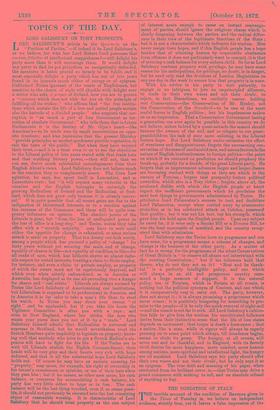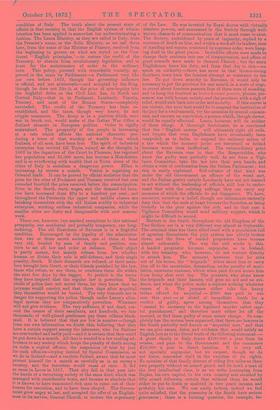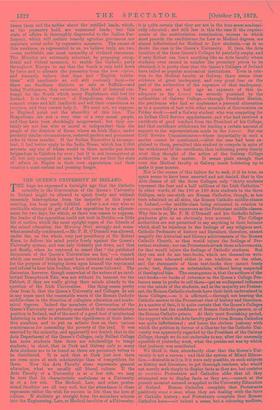THE CONDITION OF ITALY. condition of Italy. The truth about
the present state of affairs in that country is, that the English system of admin- istration has been applied in somewhat too undiscriminating a fashion. The Lanza Ministry, as they are called in Italy, from the Premier's name, or the Sella Ministry, as we call them here, from the name of the Minister of Finance, resolved from the beginning to govern on what are styled on the Con- tinent "English principles,"—to restore the credit of the Treasury, to abstain from revolutionary legislation, and to trust for the maintenance of order to the ordinary laws. This policy, pursued with remarkable tenacity, ap- proved in the main by Parliament—a Parliament very like our own before 1832, though the governing influence is official, and not aristocratic—and accepted by the King, though he does not like it, at the price of non-inquiry into the frightful debts on the Civil List, has, in North and Central Italy—that is, in Piedmont, Lombardy, Venetia, Tuscany, and most of the Roman States—completely succeeded. The credit of the Treasury has been re- established, and the taxes, though very heavy, do not cripple commerce. The Army is in a position which, were war to break out, would make of the Italian War Office a distinct element in European politics. Order is rigidly maintained. The prosperity of the people is increasing at a rate which affects the national character, pro- ducing a trace of that worship of wealth from which Italians, of all men, have been free. The spirit of industrial enterprise has revived till Turin, ruined, as she thought, in 1862 by the departure of the Court to Florence, has regained her population and 35,000 more, has become a Manchester, and is so overflowing with wealth that in Turin alone of the cities of Italy is socialism a dangerous power. Milan is increasing by streets a month. Venice is regaining an Oriental trade. It can be proved by official statistics that the price for the wine of Piedmont and Tuscany received last year exceeded fourfold the price received before the emancipation. Even in the South, rents, wages, and the demand for luxu- ries have increased from fifty to a hundred per cent., and throughout the Peninsula the upper and middle classes are betaking themselves with the old Italian avidity to industrial enterprise, working endless industrial companies, while the smaller cities are dusty and disagreeable with new masons' work.
There are, however, two marked exceptions to this national prosperity, one accidental and probably temporary, one long- enduring. The old Exarchate of Ravenna is in a frightful condition. Encouraged by the legality of the administra- tion, two or three secret societies, one of them at least very old, headed by men of family and position, con- trive to set all law and order at defiance. Their object is partly money, but mainly release from law whether human or divine, their rule is self-defence, and their single penalty, death. If their demands are refused, or their mem-
bers brought into Court, or their friends punished by the law, those who refuse, or sue them, or condemn them die within the next few days by the dagger. So perfect is the terror they have inspired that the regular law is powerless. The chiefs of police dare not arrest them, for they know that no juryman would convict, and that three days after acquittal they themselves would be buried. The very Generals are in danger for supporting the police, though under Lanza's ultra- legal system they are comparatively powerless. Witnesses will not give evidence. The very sufferers, if not dead, con- ceal the names of their assailants, and hundreds, we fear thousands, of well-placed gentlemen pay these villains black- mail. It is believed that they are few in number—though from our own information we doubt this, believing that they have a certain support among the labourers, who for Italians are overworked and badly paid—and it is certain that they could be pat down in a month. All that is wanted is a law making ad- herence to any society which keeps the penalty of death among its rules a capital offence, the suspension of trial by jury for such offences—trying instead by Special Commission, as we do in Ireland—and a resolute Prefect, aware that he must protect himself for a month as carefully as in an enemy's country, and the terrorism would cease at once. It did so cease in Lecce in 1817. That city fell in that year into the hands of a terrorising society of the same kind, which was managed with considerable brain, and became so absolute that it is known to have summoned rich men to come out of their houses for execution, and to have been obeyed. The Govern- ment grew angry at last, and accepted the offer of an English- man in its service, General Church, to restore the supremacy of the Law. He was invested by Royal decree with virtually absolute powers, and announced to the Society through well- known channels of communication that it must cease to exist. The Society, emboldened by years of impunity, replied by a sentence of deatli on him, and within a week all its leaders, men of standing and repute, sentenced by supreme order, were hang- ing dead in the great piazza. Incredible efforts were made to change their sentence into one of transportation, and offers of great rewards were made to General Church ; but the stern Englishman knew his duty, and from that day to this—we speak on authority—there has never in that licence-loving Southern town been the faintest attempt at resistance to the law. To put down anarchy in Ravenna, it would only be necessary to put the province for one month in a state of siege, to arrest about fourteen persons, four of them men of standing, and to hang the fourteen as hostes hunuzni genetis, pirates, per- sons at war with human society, and the province, with a sigh of relief, would sink back into order and security. If this course is too violent, the next best would be to suspend the institution of the jury for a twelvemonth, try the assassins by special commis- sion, and execute on conviction, a process which, though slower, would be equally effectual. Lanza, however, will do neither of these things. A thorough doctrinaire, he is convinced that the "English system" will ultimately right all evils, and forgets that even Englishmen have occasionally been compelled, as in India, to suspend the ordinary action of a law which the moment juries are terrorised or bribed becomes worse than ineffectual. The extraordinary point about the Ravenna case is, that the Respectables, who know the guilty men perfectly well, do not form a Vigi- lance Committee, take the law into their own hands, and obtain a vote of condonation from the Italian Parliament ; but this is easily explained. Self-reliance of that kind was under the old Government an offence of the worst sort, and the Italian gentry outside Lombardy have not yet learned to act without the leadership of officials, still less to under- stand that with the existing suffrage they can carry any measures of which the officials do not disapprove. We have, moreover, ourselves a belief, though our informants earnestly deny this, that the mob at heart favours the Societies, as being friendly to the poor against the rich, and in that case a Vigilance Committee would need military support, which it might be difficult to accord.
Matters in the South, throughout the old Kingdom of the Two Sicilies, are in a very different way almost as deplorable. The criminal class has there allied itself with a population full of agrarian discontents, the jury system has utterly broken down, and the lives of landed proprietors have become almost unbearable. The way the evil works is this. A landed proprietor becomes unpopular, as in Ireland, with the tenantry, who, however, do not venture directly to attack him. The moment, however, that he stirs out of his house, the " brigands " either shoot him or carry him off to the mountains, demanding, under penalty of muti- lation, enormous ransoms, which when paid do not secure him from being shot next day. The peasants, who alone know the brigands and their haunts, will give no aid and no evi- dence, and when the police make a capture nothing whatever comes of it. The jurymen either take the heavy
bribes offered for acquittal — E800 was paid in one case this year — or afraid of immediate death for a
verdict of guilty, agree among themselves that they "cannot be accessory to the legalised murder called capi- tal punishment," and therefore must either let off the
accused, or find them guilty of some minor charge. So com- pletely has the system been organised, that there are lawyers in the South perfectly well known as "acquittal men," and that
we can give names, dates, and evidence that would satisfy an English jury as to the literal truth of the following statement :— A great family in Italy draws £100,000 a year from its estates, and pays to the Government and the communes £38,000 a year in direct taxation. It is very old, not specially unpopular, but we suspect, though we do not know, somewhat rigid in the exaction of its rights.
No member of that family dreams of riding five miles on their own property without an armed guard, and its head, a man of the best intellectual class, is as we write journeying from Naples, his own capital, to his own country seat escorted by fifty armed followers, certain that without them he would
either be put to death or mulcted in two years' income, and probably his ears. We can easily believe, indeed we feel quite satisfied, that the peasantry in the South have serious grievances ; there is a burning question, for example, be- tween them and the nobles about the unfilled lands, which, as the peasantry hold, are communal lands ; but this state of affairs is thoroughly disgraceful to the Italian Par- liament, which will neither remedy agrarian grievances nor maintain social order by repressive measures. The causes of this weakness, as represented to us, we believe truly, are two, —one creditable, one most unworthy of civilised statesmen. The Ministry are extremely reluctant, by proposing excep- tional and violent measures, to enable the Catholic party throughout Europe to say that the South is only held down by force and to alienate the peasantry from the new re'gime, and sincerely believe that time and " English institu- tions" will ameliorate an evil still curiously local—for there are Southern districts as safe as Suffolk—and being Northerners, they entertain that kind, of internal con- tempt for the South which many Englishmen still feel for Ireland. It is the " nature " of Neapolitans, they think, to -commit crime and kill landlords and sell their consciences as jurymen, and they cannot help it. We need not, we suppose, in England point out the absurdity of this idea. The Neapolitans are not a very wise or a very moral people, and they have been shockingly misgoverned ; but they cer- tainly are not less wise or moral or independent than the people of the districts of Berar, where an Irish Major, under precisely similar circumstances, restored perfect and permanent order in three months. If the Italian Executive is incompe- tent, it had better apply to the India House, which has 2,000 servants any one of whom would in three months put down brigandage in Calabria for ever ; but it is not incompetent at all, but only composed of men who will not see that the state of affairs in Naples is their own opprobrium and their -country's most serious and pressing danger.




































 Previous page
Previous page